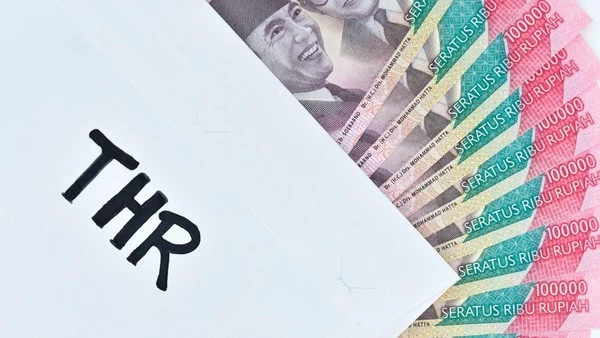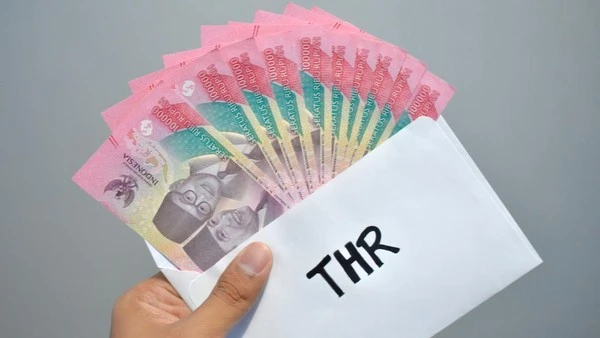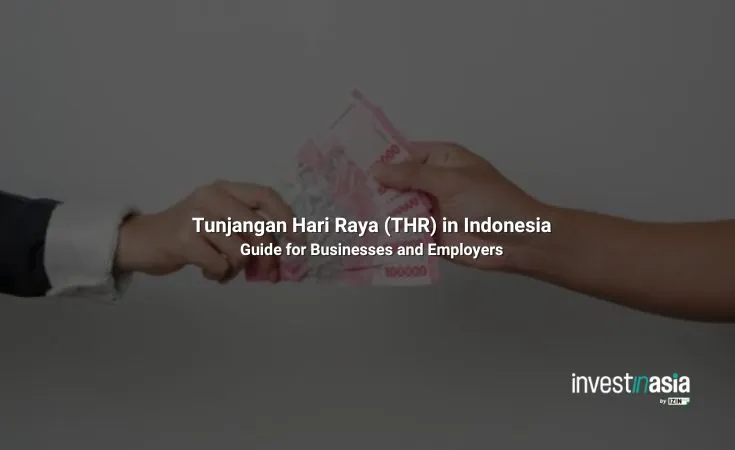In Indonesia, Tunjangan Hari Raya (THR) is a mandatory annual bonus every employer must provide to employees before their respective religious holidays. It is not a goodwill gesture but a legal requirement embedded in Indonesia’s employment framework. Often called the “13th-month salary,” THR symbolizes appreciation and social harmony in Indonesian labor culture, which is a crucial factor for employers to understand and comply with.
Legal Foundation and Obligations


THR regulations are grounded in three key instruments:
- Government Regulation (PP) No. 36 of 2021 on Wages
- Minister of Manpower Regulation (Permenaker) No. 6 of 2016 on THR Payments
- Circular Letter No. M/2/HK.04.00/III/2025 issued by the Minister of Manpower
These rules collectively ensure that every employer, whether a corporation, SME, or individual, is legally bound to pay THR to eligible employees.
Also read: Indonesia Labour Law & Employment Regulations: Complete Guide
Religious Holidays Covered
THR must be paid based on the employee’s religion:
- Eid al-Fitr (Islam)
- Christmas (Christianity)
- Nyepi (Hinduism)
- Vesak (Buddhism)
- Chinese New Year (Confucianism)
Each employee receives THR once per year, aligned with their specific religious holiday.
Also read: Indonesia Public Holiday: A Comprehensive Guide
Who Must Pay THR?
All employers in Indonesia are required to pay THR without exception, regardless of company size or industry. This includes:
- Corporations (public/private)
- MSMEs and SMEs
- Individual employers
- Foundations and associations
- State-Owned Enterprises
Even foreign companies operating in Indonesia must pay THR to their Indonesian employees, although expatriates are not eligible.
Eligibility and Calculation


Who Is Entitled to THR
Eligible recipients include:
- Permanent employees (PKWTT)
- Contract employees (PKWT)
- Daily workers
- Freelancers (if meeting minimum service requirements)
Minimum service period: 1 month of continuous work.
THR Formula
Here’s how to calculate THR for your employees:
- 12 months or more: 1 month’s full salary
- 1 to 11 months: (Months worked ÷ 12) × 1 month’s salary
“One month’s salary” includes basic salary and fixed allowances only. Variable or performance-based payments are excluded.
Also read; Indonesia’s Omnibus Law: InvestinAsia’s Guide for Foreign Investors, Businesses, and Employers
Payment Deadline and Currency
THR must be paid at least 7 days before the employee’s religious holiday.
For example, if Eid al-Fitr 2025 falls on March 31, THR must be paid no later than March 24, 2025.
Payment must be:
- Made in full (no installments)
- In Indonesian Rupiah (IDR), as required by Bank Indonesia regulations
Penalties for Non-Compliance
Employers who fail to pay or delay THR face serious consequences:
- 5% fine on the unpaid THR amount
- Written warnings and restrictions on business operations
- Temporary or full business suspension
These administrative sanctions are enforceable under PP No. 36/2021 and Permenaker No. 6/2016. Persistent violations may even lead to criminal investigation under broader manpower laws.
Exceptions for Financial Hardship
If a company faces genuine financial difficulty, it may postpone THR payment, but only if:
- It reaches a written agreement with employees at least 30 days before the holiday.
- It provides financial statements proving hardship.
- It submits a postponement proposal to the local Manpower Office.
Even then, the postponed THR must be paid no later than one day before the religious holiday.
Tax Implications
THR is considered taxable income and subject to Income Tax (PPh 21) withholding by the employer. The applicable calculation uses the Tarif Efektif Rata-rata (TER) method under PER-16/PJ/2016.
Also read: Exploring Indonesia’s Incentives for Labor-Intensive Industries
Employer’s Checklist for THR Compliance
Before Payment:
- Identify eligible employees
- Calculate correct amounts (basic salary + fixed allowances)
- Ensure payment in Rupiah
- Prepare payroll records
During Payment:
- Pay in full, at least 7 days before the holiday
- Issue clear payment documentation
- Withhold appropriate PPh 21 tax
After Payment:
- Maintain proof of payment
- Prepare for potential labor audits
- Report if required by local authorities
Also read: What Is BPJS in Indonesia: Legal Framework, Benefits, and Compliance
Cultural and Business Significance
For businesses, especially those managed by foreign investors, THR reflects more than just compliance. It demonstrates respect for Indonesia’s cultural values and commitment to employee welfare. Timely THR payment helps strengthen workforce morale, company reputation, and long-term retention.
Understanding THR is essential for any employer operating in Indonesia, as it represents both a legal obligation and a symbol of trust in employer-employee relations.
How InvestinAsia Can Help
As experts in Indonesian employment compliance, we at InvestinAsia provide complete payroll services, ensuring your company meets all local regulations, including accurate salary and THR calculations, timely disbursements, and full compliance with tax and labor regulations.
If you are unsure about THR calculations, deadlines, or compliance requirements, our payroll specialists can manage everything seamlessly on your behalf.
Learn more about InvestinAsia Payroll Services in Indonesia.
THR compliance is not just a formality; it is a core component of Indonesia’s labor ecosystem. For employers, especially foreign investors, understanding and implementing THR correctly safeguards both legal compliance and business reputation. Partnering with experts like InvestinAsia ensures that your payroll operations align fully with Indonesian labor law and cultural expectations.
Contact us now for FREE consultation!
FAQs about THR in Indonesia
What is THR in Indonesia?
THR (Tunjangan Hari Raya) is a mandatory religious holiday allowance that employers must pay annually to employees before their respective religious holidays.
Who is entitled to receive THR?
All Indonesian employees who have worked continuously for at least one month, including permanent, contract, and daily workers.
When should THR be paid?
At least 7 days before the employee’s religious holiday.
Can THR be paid in installments or foreign currency?
No. THR must be paid in full and in Indonesian Rupiah.
What happens if a company fails to pay THR?
The company faces a 5% fine on unpaid THR, administrative sanctions, and possible business suspension.



